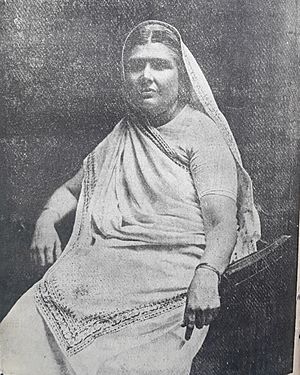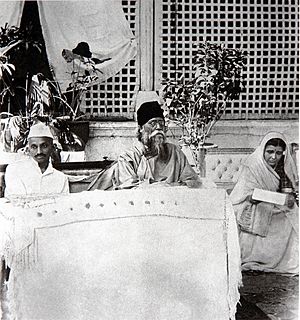Sharda Mehta facts for kids
Quick facts for kids
Sharda Mehta
|
|
|---|---|

Sharda Mehta
|
|
| Born | 26 June 1882 |
| Died | 13 November 1970 (aged 88) Vallabh Vidyanagar, Gujarat, India
|
| Education | Bachelor of Arts |
| Alma mater | Gujarat College |
| Occupation | Social reformer, educationist and writer |
| Spouse(s) |
Sumant Mehta
(m. 1898; died 1968) |
| Children | Ramesh Sumant Mehta |
| Parents |
|
| Relatives | Vidyagauri Nilkanth (sister) |
Sharda Mehta (born June 26, 1882 – died November 13, 1970) was an important Indian social worker. She strongly believed in education for girls and women. She was also a talented writer in the Gujarati language.
Sharda Mehta came from a family that worked to improve society. She was one of the first two women in the area now known as Gujarat to earn a college degree. She helped start schools and organizations to support women's education and well-being. She wrote many essays and her own life story. She also translated books into Gujarati.
Contents
Early Life and Education

Sharda Mehta was born in Ahmedabad on June 26, 1882. Her father, Gopilal Manilal Dhruva, was a judge. Her mother's name was Balaben. Her family was known for its efforts to improve society. Her great-grandfather, Bholanath Divetia, was a famous social reformer and poet.
Sharda went to Raibahadur Maganbhai Girl's High School for her early education. She then studied at Mahalakshmi Teachers Training College. She finished high school in 1897. In 1901, she earned a Bachelor of Arts degree from Gujarat College. She studied Logic and Moral Philosophy. Sharda and her older sister, Vidyagauri Nilkanth, were the first two women in Gujarat to graduate from college.
In 1898, Sharda married Sumant Mehta. He was studying medicine at the time. He later became a doctor for the royal family of Baroda State. He was also a dedicated social worker.
Her Work for Society
Helping Others and Social Change
Sharda Mehta worked hard for many social improvements. She supported education for everyone, especially women. She also worked for women's empowerment, which means helping women have more control over their lives. She was against strict caste rules and worked to end untouchability. She also supported India's fight for independence from British rule.
Mahatma Gandhi greatly influenced her work. From 1906, she encouraged people to use swadeshi goods. These were products made in India, like khadi clothes. This helped support local businesses. In 1917, she organized a protest against a system called indentured servitude. This was when Indian workers were forced to work in other countries.
In 1919, she helped Indulal Yagnik edit the newspaper Navjivan. In 1928, she took part in a large meeting for farmers in Ahmedabad. She also met with the Governor of Bombay to discuss problems faced by farmers during the Bardoli Satyagraha protest.
In 1929, she spoke to a special commission about the working conditions in textile factories in Ahmedabad. During the civil disobedience movement in 1930, she protested outside shops that sold alcohol. In 1931, she opened a khadi store. She also worked at her husband's ashram (a spiritual retreat) near Shertha. In 1934, she started a co-operative store called Apna Ghar Ni Dukan.
Sharda Mehta was involved with many groups that helped with education and women's welfare. These groups were in Ahmedabad, Baroda, and Bombay. She was also a member of the Baroda People's Association. From 1931 to 1935, she served on the Ahmedabad City Council. In 1934, she started the Jyoti Sangh, an organization focused on women's well-being.
She was a strong supporter of women's education. She helped establish the Vanita Vishram Mahila Vidyalaya in Ahmedabad. She also started a college that was connected to the SNDT (Karve) Women's University.
Her Writings
Sharda Mehta was a deep thinker and reader. She studied ancient Hindu texts and Sanskrit literature. She was also inspired by the works of thinkers like Aurobindo, Sukhlal Sanghvi, and Sarvepalli Radhakrishnan.
She was known for her essays, biographies (life stories), and translations. She wrote essays about social issues for newspapers and magazines. In 1906, she published Puranoni Balbodhak Vartao. This was a collection of children's stories designed to help them learn and grow.
She wrote a biography of the famous English social reformer Florence Nightingale in 1906, titled Florence Nightingale Nu Jeevancharitra. She also wrote Grihavyavasthashastra in 1920, which was about managing a household. Her book Balakonu Gruhshikshan (1922) focused on how to educate children at home.
In 1938, Sharda Mehta wrote her autobiography, Jeevansambharana. This book shared her memories and experiences, especially her public life and her efforts for women's education. It covered the years from 1882 to 1937. It also described the social, historical, and political situation of the time and how women were becoming more aware of their rights.
With her sister, Sharda Mehta translated several important books. They translated Romesh Chunder Dutt's Bengali novel Sansar (also known as The Lake of Palms) into Gujarati as Sudhahasini in 1907. They also translated Position of Women in Indian Life (1911) by the Maharani of Baroda (Chimnabai II). Their Gujarati translation was called Hindustanma Streeonu Samajik Sthan or Hindustanna Samajik Jeevanma Streenu Sthan (1915). She also translated Sathe Annabhau's novel as Varnane Kanthe.
Later Life
Sharda Mehta passed away on November 13, 1970, in Vallabh Vidyanagar.

